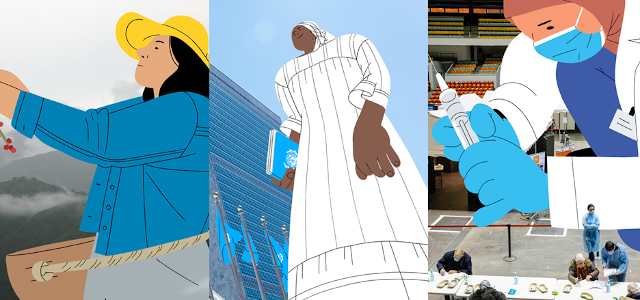GWPSA is working to transform gender inequalities in the sector through the Water, Climate, Development, and Gender Investments (AIP WACDEP-G) support programme.
Dr Nawa Mwale, Gender Advisor: GWPSA
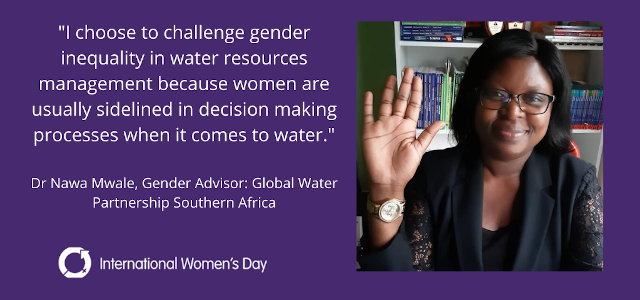
I choose to challenge gender inequality in water resources management because women are usually side-lined in decision making processes when it comes to water. Engaging both women and men in planning, developing, and managing water resources improves the efficiency and sustainability of water projects.
My work at GWPSA enabled me to be part of a stakeholder workshop in October 2020 in Zambia where it was discussed that more women should be encouraged to take up Science, Technology, Engineering, and Mathematics (STEM) subjects, and have role models, and mentorship programmes for young female professionals interested joining the water sector. The AIP WACDEP-G support programme aims to transform gender inequalities by promoting gender transformative planning, decision-making, and institutional development for climate resililience, addressing gender inequalities across Africa. Therefore, I am in and I choose to challenge and call out gender inequality.
Caroline Rukundo, Gender Advisor: Global Water Partnership Eastern Africa
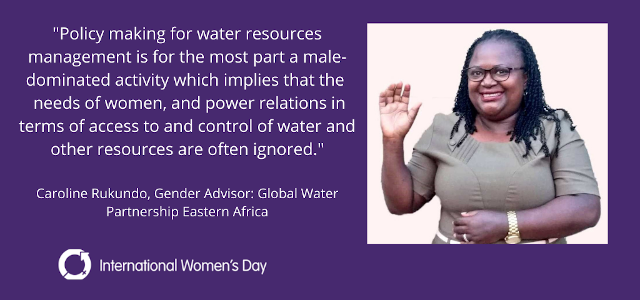
Women are the heaviest users of water, yet they are not part of the structures that manage this crucial resource. Labour-intensive activities, ranging from walking long distances to fetch water, to cooking and washing, are rarely considered in the planning and management of water resources.
Policy making for water resources management is, for the most part, a male-dominated activity, which implies that the needs of women, and power relations in terms of access to and control of water and other resources are often ignored. While women are mostly end-users of water, they are glaringly absent when it comes to decision making, however, I believe they should be meaningfully involved in the decision making and management of water resource initiatives.
Maria Amakali, Director of Water Resources Management and Acting Deputy Executive Director for Water Affairs, Namibia
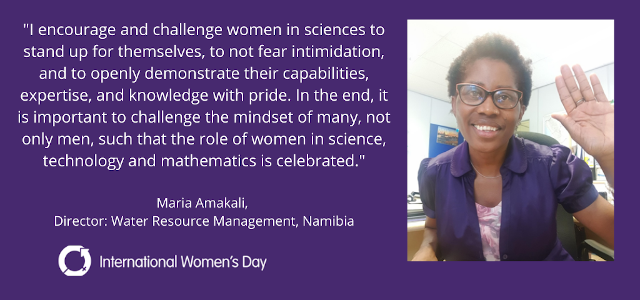
Water resources management is one of the fields of science that has been male dominated for decades. Although a lot of women have been joining the field and the workforce as scientists and engineers as well as in leadership positions, we still remain hidden figures.
The old gender stereotypes about women continue to persist. Women are hardly recognised as able leaders, rather as someone accompanying a man to a meeting or to the field. We remain outnumbered and under-represented. As women, we need to rise-up, and exert our power with confidence.
There is no need to fear being labeled aggressive, until such a time that we are seen as equal. I don’t always want to be given a gender role that should be assigned to the inexperienced person or less senior person in the room just because I am a woman. The reasoning along the lines of: “you know this so well, or it is in your department, please initiate” must be challenged. If women know so much, they should be equally acknowledged in the same positions, expertise, leadership, and decision-making men are held, without questioning their capabilities.
Women should be appointed on merit, not just to sustain a gender balance. There are many well-educated women experts in the water sector, however their career progression is delayed due to a blatant lack of acknowledgment. Women must be credited and honored for the work they accomplish. Simultaneously, women should stand up and take all the credit due to them.
Over the years, Namibia has seen an increased number of women, particularly young women, entering the water sector and taking up management positions. My Directorate, Water Resources Management, has a 50% gender balance among the professional and management staff. The women professionals are not hidden and they are capable of doing the work. They lead, they manage, they implement. They receive credit for what they do, and are encouraged to rise up, be confident, and not remain inconspicuous. Women are placed in charge to lead Namibia delegations at national and international platforms.
Litumelo Mate-Sievers, Gender Specialist: GWPSA
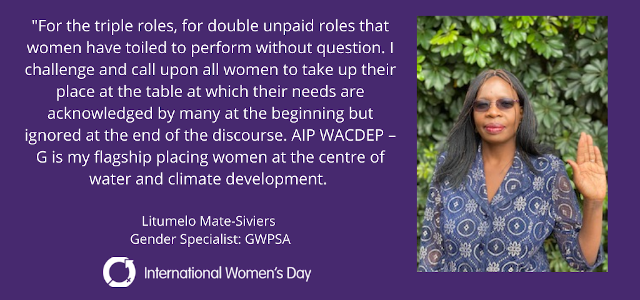
For the triple roles, for double unpaid roles that women have toiled to perform without question in many an instant. Today, I Challenge and call upon all women to take up their place at the table at which their needs are acknowledged by many at the beginning but ignored at the end of the discourse.
AIP WACDEP-G is my flagship placing women at the centre of water and climate development, to those involved let us use this opportunity to foster Women’s Aspirations, to Carve, Develop, and allow to Evolve for Greatness. I pledge.
Bogadi Mathangwane, Director, Botswana Ministry of Water
Botswana recognises gender equality as central to socio-economic, political, and cultural development through its National Vision 2036. What needs to be challenged is the stereotype that the water sector is a male field. Women are equally capable of performing in the field.
I am a living example, as I am the first female Director for a national institution that deals with the assessment, planning, development, and protection of water resources in the country since 1957. The achievements during my tenure include infrastructure development under very challenging circumstances in a male dominated industry, as well as the completion of key national water and sanitation priority projects.
Dr Manta Noowbuth, Interim Coordinator: Mauritius Water Partnership
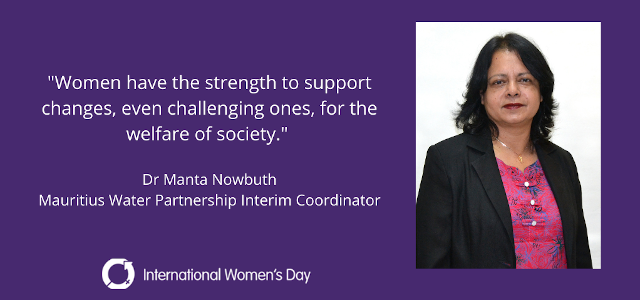
For more resources and information about International Women's Day, please click here.
